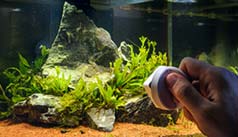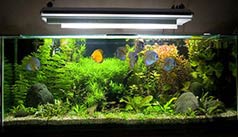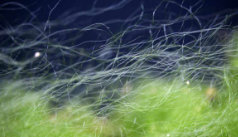

Freshwater aquarium The aquarium in summer
The aquarium in summer: heat, vacations ... how to do?
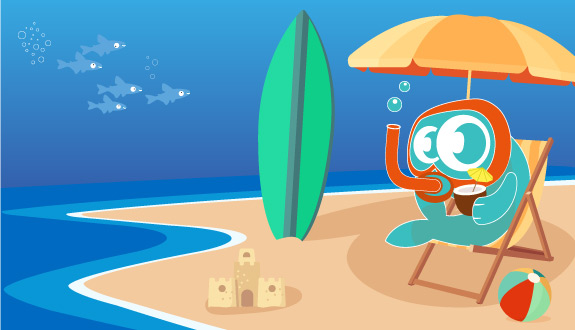
Our other guides (click on the thumbnail)
Fight against heat
This situation has happened to all aquarists: the temperature rises during the summer. So even though many of us were enjoying this summer heat, our aquariums don't really appreciate this rise in temperature. Indeed, the warmer the ambient air gets, the warmer the water temperature rises as well.
Many fish are now acclimatized to withstand a temporary increase in temperature. But the real problem, beyond the temperature, is the lack of oxygen. Indeed, the warmer the water is, the less oxygen it contains. So how can we make sure that our aquariums don't suffer too much from the heat this summer?
Here are some basic tips:
WHAT TO DO
Check the temperature of your aquarium every day.
Check the gas exchanges on the surface: is there enough eddies or is the water stagnant? Improve the air/water exchange and lower the temperature by installing a good surface stirring.
Lighting generally produces a lot of heat. Reduce lighting time to reduce the heat produced. If this is not enough, reverse the lighting cycle so that it stays off during the day and comes on at night. This way, the heat generated for the lighting system is not added to the daytime ambient temperature, but to the cooler nighttime temperature.
Leave the cover open to help cool the water. Please note that this only applies to fish that are not likely to jump out of the aquarium!
If you leave your aquarium open, the evaporation will be higher than usual during this period. Top up the water level with slightly cooler osmosis water, preferably every day.
Make small water changes on a regular basis with slightly cooler water.
Do not expose the aquarium to direct sunlight. If necessary, close the shutters. This also applies to outdoor litterbeds, which should not be exposed to full sun during the hottest hours of the summer: place them in the shade in the afternoon.
Air-condition the room in which the aquarium is located. If this is not possible, keep the room as cool as possible: close the shutters, ventilate only at night...
Aerate the water surface as much as possible by directing a conventional fan towards the water surface. This is quite effective. Some aquarists use mini-fans (for computer for example) that they fix on the walls of the aquarium. Be careful with your connections with this type of material, not necessarily waterproof. Reserve it for the most do-it-yourselfers! Please note however that you can nowadays find this type of ramp in the aquarium trade, for a safe use!
Use a cooling unit: it is THE ideal solution. Too bad it's not within the reach of everyone...
The technical equipment needed for the aquarium produces heat. For example, the motor of the filter pump converts part of the electricity into heat. If possible, opt for external filtration.
The installation of an air pump (bubbler) helps to re-oxygenate the water efficiently (caution, may slightly vary the pH).
DO NOT DO
Do not unplug the heater. Immersion heaters are equipped with a thermostat and therefore do not operate above the desired temperature. For example, if your heating system is set to 24°C (75°F), and the water is at 26°C, it will not operate. It is therefore useless and inefficient to turn it off.
Do not make large water changes with cooler water. Fish do not appreciate large temperature changes that cause thermal shocks that can be fatal.
Same problem as above with the use of frozen plastic bottles placed in the aquarium to cool it down. We do not recommend this technique as it will cause the temperature of the aquarium to fluctuate uncontrollably. The water will drop in temperature sharply when the ice is introduced, and then rise quickly once the ice melts. These variations, contrary to relieving your fish, will put their health to the test by subjecting them to important thermal shocks.
Leaving on vacations
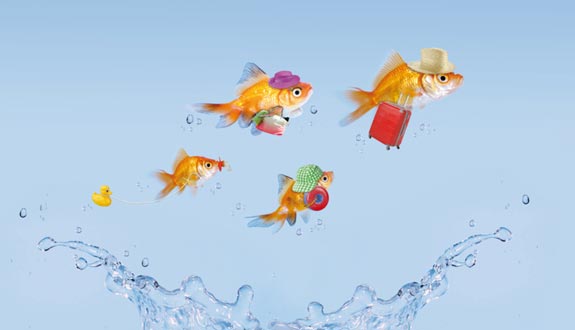
It's finally the big moment of the year! You're going on a well-deserved vacation! But what to do with your aquarium while you're away? Here is what you need to know:
Did you know that healthy fish can fast for about 2 to 3 weeks? Indeed, in the wild, they do not find food every day. Therefore, they are able to go without eating for some time.
Avoid at all costs the vacation blocks offered in the shops. Indeed, they enormously pollute the water in the aquarium, and you are not there to change it! It is better that your fish do not eat for a few days than to suffer from such pollution, which is much more dangerous than the lack of food.
A good source of food while you are away would be live prey in the aquarium. So, introduce a good quantity of live daphnia or gammaras before you leave. The advantages of this method are numerous:
- the prey will be hunted and eaten several days after your departure, providing a source of food for your prey
- stimulates the hunting instinct of your fishes
- healthy food
- does not pollute the aquariumCan one of your loved ones drop by from time to time during your absence? Prepare him the portion of food he will distribute to your fish! For longer absences, it will be necessary to find a volunteer to change the water, which must be done at least once a month (ideally once every two weeks).
Useful information
Fish suffering from lack of oxygen show the following signs of distress:
- come to the surface to pump the air
- not very active, apathetic
- disorderly movements
- are looking to jump out of the bin
- difficult breathing
If you notice these symptoms, take prompt action to lower the aquarium temperature and re-oxygenate the water.Long finned fish are more prone to rot disease in the summer as the temperature rises (bacteria become more active and reproduce more). If you have these kinds of fish, watch them closely!
Some products used in summer are toxic for our aquariums. And even if we obviously do not use them directly in the water, the water/air gas exchanges can dissolve certain toxic substances in the water. Let's quote for example anti-mosquito products and all insecticides by the way. Also be careful with sunscreen: if you have put some on, do not put your hands in the water of your aquarium.
In the same idea, some products used all year round are harmful to aquatic life: cigarette smoke, perfume diffusers, incense... Avoid using these products in the room where your aquarium is located!
